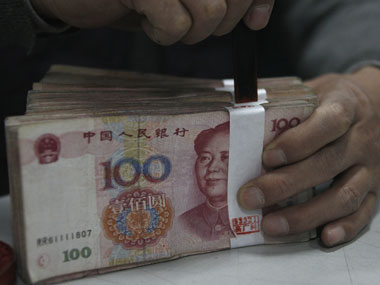Beijing : China’s services industry expanded at its fastest pace for 19 months in May, with new business and optimism about the future robust, according to a private-sector survey of purchasing managers published on Tuesday.
The HSBC China Services Purchasing Managers Index (PMI) rose to 54.7 in May, extending from April’s six-month peak of 54.1. The survey’s compiler, Markit, cited new business growth as the key driver of the index.
“This should reduce the fears of a sharp growth slowdown. Going forward, the expected fast delivery of a mix of supportive measures should filter through to further boost services output and employment,” Qu Hongbin, chief China economist at HSBC said in a statement accompanying the index.
[caption id=“attachment_332326” align=“alignleft” width=“380” caption=“Expansion of China’s services industry brings business optimism. Reuters”]  [/caption]
The increase in the HSBC Services PMI comes in marked contrast to China’s official non-manufacturing PMI, which showed a second straight monthly decline when it was published, easing to 55.2 from April’s reading of 56.1.
The difference is a result of using differing methodologies and samples. Still, both are above the 50-mark, which divides expansion from contraction.
Their relatively robust readings, particularly compared to the findings of PMI surveys on manufacturing, also reflect the long-term optimism of businesses benefiting from a gradual rebalancing of activity in the world’s second-biggest economy towards services and consumption.
China’s vast factory sector betrayed signs of a broadening slowdown in May, as the official and HSBC PMI survey last week signalled deeper-than-forecast deterioration in demand at home and abroad, pointing to the likelihood of more policies to support economic growth.
The official purchasing managers’ index - covering China’s biggest, mainly state-backed manufacturers - fell more than expected to 50.4 in May. It was the weakest reading this year and down from April’s 13-month high, with output at its lowest since November 2011.
The HSBC China manufacturing PMI, tracking smaller private-sector firms, retreated to 48.4 from 49.3 in April- its seventh straight month below 50. The employment sub-index fell to 48.1, its lowest level since March 2009.
Confident Services Outlook
The HSBC services barometer meanwhile reflected a strong level of confidence both in near-term prospects and also on a one-year horizon.
The pace of new order growth was the fastest since October 2010, with new product developments and improving demand cited alongside successful promotional activities as helping boost the headline index.
“The degree of confidence was strong, with the index measuring business expectations only slightly lower than April’s one year-high. Companies linked positive sentiment to expectations of new business wins and better economic conditions,” Markit said in a statement.
On the downside, employment growth in the services sector in May was only modest and the increase in staff numbers was weaker than the long-run trend average for the survey.
Average input costs also increased, extending the current period of inflation in the services industry to 31 months. Higher labour-related costs were the main source of inflation.
And despite the increase in new orders, the backlogs of work in the services sector fell in May. The latest decrease in volumes of work-in-hand but not yet completed was the fourth decline in as many months, Markit said.
China has increased efforts to support the economy in the face of a deepening European debt crisis and slowing demand at home, fast-tracking infrastructure investment, providing consumption subsidies in some household sectors and pushing ahead with financial reforms to help safeguard growth.
It has eased banks’ required reserves in three steps since the autumn of 2011, cutting 150 basis points in total to 20 percent and freeing up an estimated 1.2 trillion yuan for fresh lending. It has also cut taxes and slashed red tape.
Economists polled by Reuters in May said they expected a further 100 bps to be cut through the rest of this year to bring the rate down to 19 percent.
Few analysts expect a massive injection of stimulus on anything like the scale of the 4 trillion yuan programme unveiled in 2009 and many experts argue against it, even though China’s growth in 2012 is likely to be its slowest in 13 years - albeit at a rate of 8.2 percent.
Reuters


)
)
)
)
)
)
)
)
)



